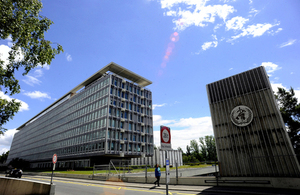Neglected Tropical Diseases Summit 2017, UK Call To Action
UK statement delivered by Lord Bates, Minister of State at DFID, on 19 April 2017 at the World Health Organization.

The World Health Organization is headquartered in Geneva
I’m pleased to be speaking at this important conference today.
We’re here because we recognise that Neglected Tropical Diseases inflict appalling human suffering on the poorest people in the world. They kill, they disable, they disfigure – sufferers are stigmatised and locked out of opportunities.
NTDs stop children going to school, they stop parents going to work – costing developing economies billions of dollars every year in lost productivity.
But all this human misery is preventable – we have the power to end this.
In the last five years we’ve started to make real progress – thanks to a powerful global movement between endemic countries, donors, pharmaceutical companies, the Carter Centre and others.
In 2015, about 1 billion people received treatment for at least one NTD – an unprecedented achievement.
We’ve made real inroads towards eliminating diseases as well. In 2016 there were 25 human cases of Guinea Worm worldwide – down from 3.5million in 1986. And I’d like to take this opportunity to commend President Carter for his leadership on Guinea Worm eradication.
Importantly, the success we’ve had tackling NTDs has hinged on a uniquely powerful public private partnership.
Most drugs for NTDs are donated by companies and without this generous support we would not have made the progress that we have - and at a far higher cost.
Britain has played a leading role in this success - through our commitment to UK Aid, through our leading NGOs, through our pharmaceutical companies’ generous donations and through our world-class universities and researchers…all working together.
Since 2009, UK Aid working with GlaxoSmithKline and the Liverpool School of Tropical Medicine has provided 217 million people with treatment against lymphatic filariasis
In 2016 UK Aid, working with Sightsavers, treated 17 million people with antibiotics against trachoma. We also supported 19 million treatments for schistosomiasis working with Imperial College London.
And UK Aid supported the development of the first ever rapid diagnostic test to screen for sleeping sickness. This simple test - that is not reliant on electricity - can be used in rural, hard to reach locations and is now being used in 19 countries.
We have also established important international partnerships – including with USAID, with Gates Foundation with WHO and World Bank.
However, far as we’ve come – there is a lot further to go.
We know where and how many people are affected, and - thanks to companies like GSK - we have the donated drugs, but right now we do not have the funds to get them to the people who need them. This needs to change,
I’ll be announcing a significant new contribution from Britain today. But, clearly, we need others to step up if we’re to finish the job on NTDs.
We need national governments to prioritise this still further and increase their health budgets. And we urgently need new funding from new donors.
These diseases are named neglected for a reason – but it’s not a name we can afford to accept.
We know what to do; we know what works – let’s rise to the challenge and end the misery of NTDs, for good.